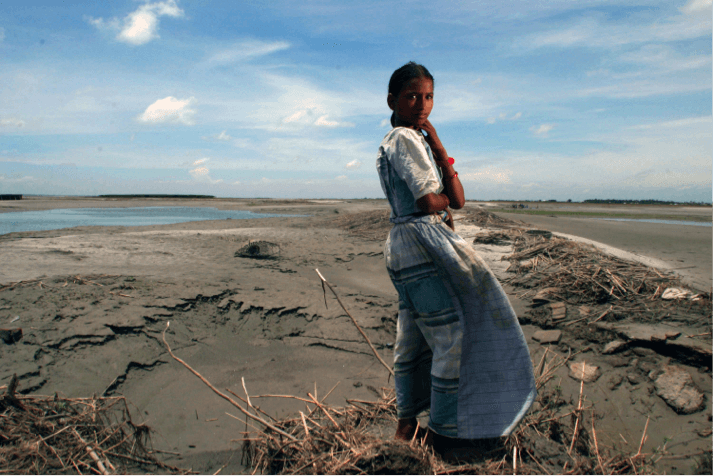Source: Bangladesh Climate Change Knowledge Network
On the evening of November 15th, 2007, a category-4 storm called Cyclone Sidr struck the low-lying coast of Bangladesh destroying everything in its path. The cyclone ravaged through 30 southern districts in both the Barisal and Khulna Divisions, where thousands of people lost their homes to strong 240 km/hr. winds, and countless others drowned and lost their lives to tidal surges 7 feet high. When the water receded, more than 3,000 individuals were dead, with over 65% of them women, and 5,000 more were missing (UNICEF Bangladesh 2007). Cyclone Sidr became one of the biggest tropical cyclones and one of the worst natural disasters to ever hit Bangladesh. Over 8.9 million Bangladeshis were affected by the storm, either through the loss of life, home, and livelihood, with women being the most disproportionately affected.
After the storm various researchers began to look into the different ways vulnerable communities, especially those of women were affected by climate change. In January 2015, the International Policy Research Institute (IPRI) published a report, which served to highlight the different ways vulnerable communities in countries like Bangladesh are disproportionally affected by climate change. The report, titled “Climate Change Adaptation Assets and Group-Based Approaches: Gendered Perceptions from Bangladesh, Ethiopia, Mali and Kenya[1],” especially highlighted the ways in which women will be affected by climate change.
Source: Ezilion Maps
In order to understand these impacts for women, it is important to visualize the country as a whole. Bangladesh is a lush, green, predominately agricultural country located in South Asia and is among the most densely populated countries in the world. Approximately 75% of the population lives in rural areas that are highly dependent on subsistence farming among other agricultural activities that are highly sensitive to the impacts of climate change. Among these people is Swapna Begume. She has been living in her small town, South Kainmari, located in the Khulna Division of Bangladesh. She recalls Cyclone Sidr as a traumatizing experience, because even though they are constantly affected by natural disasters, like cyclones, the events are becoming much more magnified and destructive than ever.
The climatic changes Swapna talks about are just a few of the kinds of events the International Policy Research Institute addresses in their report. They include the possibility of a scenario with high emissions (more than 12,000 parts per million of CO2 equivalent), where global average sea levels could increase by approximately one meter by the end of the century. This would send a good portion of Bangladesh’s coastline underwater, and flood areas surrounding the over 80 rivers and tributaries running through the country! Not only so, climate change, or sea level rise in particular, would also increase the rate at which many of the riverbanks along the three main rivers, the Brahmaptura, Ganges, and Meghna, are eroding. Furthermore, extreme weather events, such as massive flooding, killer cyclones (like Sidr), destructive storm surges, devastating droughts, heavy monsoon downpours, and deadly salinity intrusion can all further damage crops and undermine the already fragile livelihoods of most coastal communities.
Source: South Asian Disaster Knowledge Network
Women are at the forefront of the effects of these issues, especially in rural communities. More recently, there has been an influx in the number of male heads of households moving from the coastal regions of Bangladesh to urban areas. What this means for women is that they are then left behind to help keep everything, property and crops, afloat. When river erosion causes the main riverbanks to disappear, the only buffer or protection between coastal villages and flooding sources is destroyed. Furthermore, in the case of disaster, the female head of the household has the responsibility to secure the safety of everyone and everything before she can think of herself. After disasters, even if a woman survives, if her husband or father is killed during a natural disaster, she can lose access and ownership of her property, due to gender biased inheritance and family laws, lack of information about legal rights, and inability to access the justice system. For women in Bangladesh, control over assets and property is highly dependent on gender, which almost always favors men, so women are forced to attempt to survive in the harshest of conditions. Climate change also plays a huge role here because the impacts are expected to magnify the intensity and frequency of destructive storms like Cyclone Sidr. Swapna remembers that during Cyclone Sidr she was forced to decide whether she would save herself and her daughter or attempt to collect and safeguard her sheep and home.
Moreover, for those, like Swapna, who heavily rely on natural resources for survival, their ability to find resources and ways to adapt to climate change impacts is hindered by their gender. In a traditional society, like the one that exists in Bangladesh, women are often not allowed to be part of public conversations and are, therefore, less likely to receive critical information for emergency preparedness. The desire to gather the knowledge and tools in preparation for climate change is present in communities of women; the only thing missing is data that will support this will. The International Policy Research Institute included a very important point: adaptation strategies are defined by the way both men and women’s ideals intercept and intertwine with each other. However, with the current lack of information on the impacts climate change has on women, adaptation strategies will not be inclusive of women’s needs.
[1] Aberman, Noora-Lisa; Ali, Snigdha; Behrman, Julia A.; Bryan, Elizabeth; Davis, Peter; Donelly, Aliveen; Gathaara, Violet; Kone, Daouda; Nganga, Teresiah; Ngugi, Jane; Okoba, Barrack and Roncoli, Carla. 2015. Climate, change adaptation assets and group-based approaches: Gendered perceptions from Bangladesh, Ethiopia, Mali and Kenya. IFPRI Discussion Paper 1412. Washington, D.C.; International Food Policy Research Institute (IFPRI). http://ebrary.ifpri.org/cdm/ref/collection/p15738coll2/id/128950


